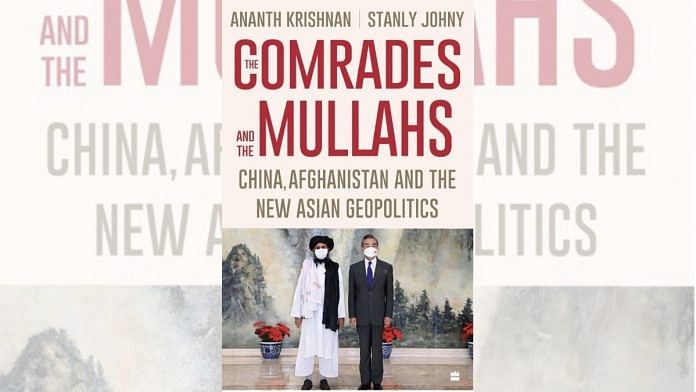New Delhi: A new book seeks to unravel what will the 21st century rivalry between the US and China mean for Afghanistan and also looks at China’s growing role in India’s neighbourhood via its engagement with the Taliban in Afghanistan.
The book “The Comrades and the Mullahs: China, Afghanistan and the New Asian Geopolitics”, written by Ananth Krishnan and Stanly Johny, comes at a time when Ukraine has been invaded by Russia, which, following the US exit from Afghanistan, has further changed power equations in Asia and the world.
Published by HarperCollins India, the book also looks at the broader theme of ‘great power games’ that are playing out in an increasingly multipolar world, the geopolitical alliances that are forming, and the impact these have on the lives of ordinary citizens.
It tells the story of the US failure in and withdrawal from Afghanistan, China’s growing ambitions in the region, and the implications that these have for India.
According to the authors, there is little doubt that the increasing closeness between China and Pakistan is perhaps India’s single biggest foreign policy challenge. They look at the changes in Afghanistan through an Indian lens, as New Delhi confronts the prospect of rising Chinese and Pakistani influence in a country that it has historically enjoyed warm ties with.
Talking about the China-Pakistan Economic Corridor, the authors say that the project is not just about economics: it is a strategic commitment by China to Pakistan, one that has dramatically altered Beijing’s calculus in how it approached relations with Pakistan and India.
“Indeed, since its launch, India has been alarmed by the extent to which China has once again begun deferring to Pakistan’s interests on key bilateral issues: the protection of Masood Azhar at the UN Security Council, as we have seen, is a case in point.
“This was a reversal of a two-decade trend that saw Beijing attempt to more carefully strike a balance between its historical ties with Islamabad on the one hand, and a sensitive but growing relationship with Delhi on the other,” the book says.
Krishnan and Johny are of the view that China’s overriding strategic concern at the moment is not India as “it is more preoccupied with the growing challenge posed by the US and its partners on its periphery”.
On the Afghan issue, the book says that Pakistan, as an important regional country and a neighbour of Afghanistan, has a very important role to play in resolving it.
The authors feel that regionalism, not rivalry, is Afghanistan’s best hope.
“It is also the only path towards breaking the familiar cycle of geopolitical great games that left great costs. Writing from our vantage point, we believe India can play a role, working with regional powers, especially Iran, Russia, the Central Asian republics and, to a limited extent, even China despite its nexus with Pakistan, to forge a coordinated response,” they argue.
On Sino-India ties, the authors say that Beijing has appeared to come to the conclusion that India’s growing closeness to the US, and the return of the Quad, suggested an inevitability of India drifting closer to the American orbit.
“As much as the PLA is driving hostile relations with India, it is a key force behind the growing closeness with Pakistan. Hu Shisheng, a leading Chinese strategic expert on India and Pakistan at the influential China Institutes of Contemporary International Relations, says the CPEC has changed the China-Pakistan equation dramatically,” they write.
This report is auto-generated from PTI news service. ThePrint holds no responsibility for its content.
Also read: Monograph pays homage to ‘rocket boy’ Homi Bhabha



